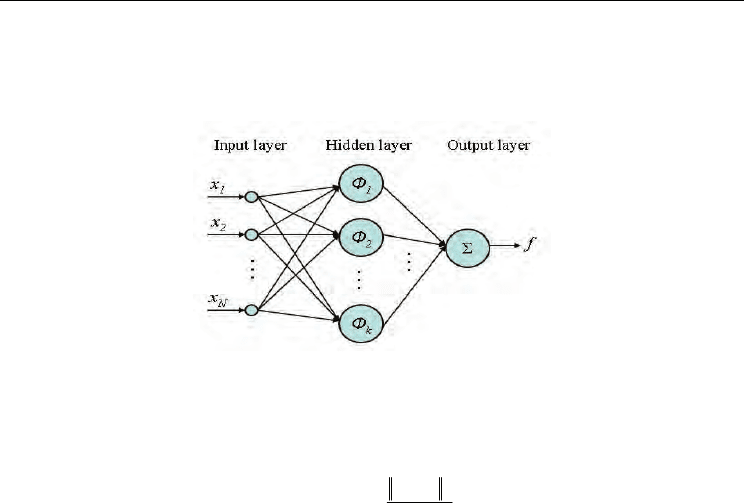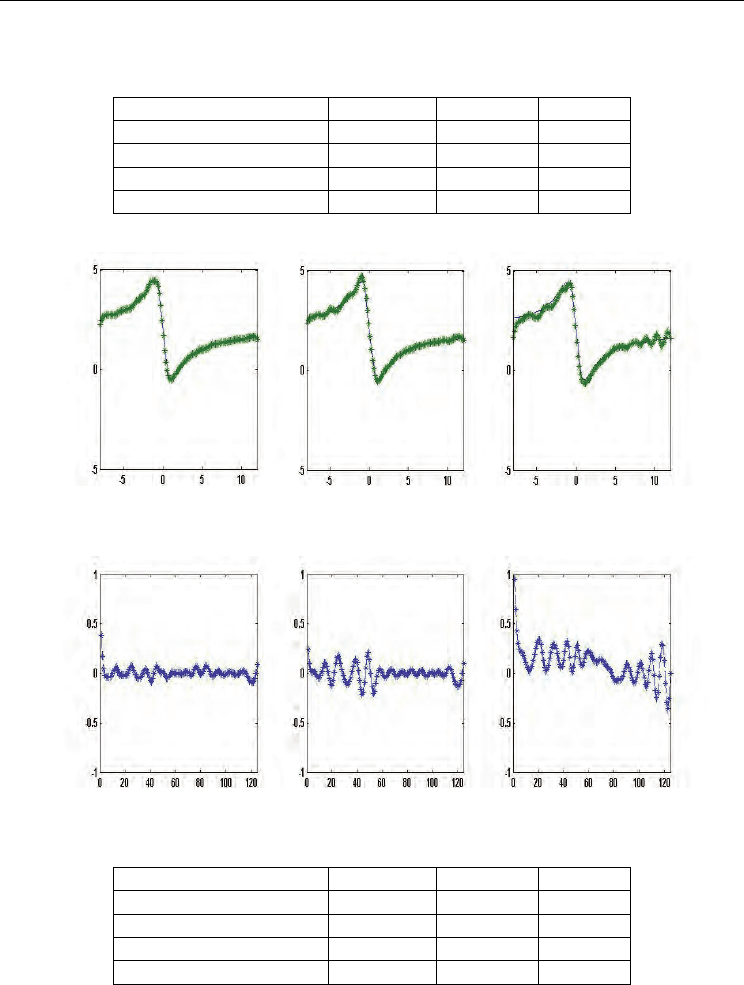Lazinica A. (ed.) Particle Swarm Optimization
Подождите немного. Документ загружается.


Discrete Particle Swarm Optimization Algorithm for Flowshop Scheduling
421
Kennedy, J. & Eberhart, R. (1995). Particle swarm optimization, Proceedings of IEEE
International Conference on Neural Networks-IV,
pp-1942-1948, Piscataway, NJ: IEEE
service center, Perth, Australia
Kennedy, J.; Eberhart, R. & Shi, Y. (2001).
Swarm Intelligence, Morgan Kaufmann, San
Mateo,CA,USA
Liu, J. & Reeves, C.R. (2001). Constructive and composite heuristic solutions to the
∑
i
C//P scheduling problem, European Journal of Operational Research., Vol.132,
439-452
Lixin Tang. & Jiyin Liu. (2002). A modified genetic algorithm for the flowshop sequencing
problem to minimize mean flowtime,
Journal of Intelligent Manufacturing, Vol.13, 61-
67
Loukil, T.; Teghem, J. & Tuyttens, D. (2005). Solving multi-objective production scheduling
problems using metaheuristics,
European Jour. of Operational Research, Vol.161, 42-61
Merkle, D. & Middendorf, M. (2000). An ant algorithm with new pheromone evaluation rule
for total tardiness problems,
Proceedings of the Evolutionary Workshops 2000, pp-287-
296, vol.1803, Lecture Notes in Computer Science, Springer
Moccellin, J.V. & Nagano, M.S. (1998). Evaluating the performance of tabu search
procedures for flowshop sequencing,
Journal of the Operational Research Society,
Vol.49, 1296-1302
Nawaz, M.; Enscore Jr, E.E. & Ham, I. (1983). A Heuristic algorithm for the m-machine, n-job
scquencing problem,
Omega, Vol.11, 91-98
Ogbu, F.A. & Smith, D.K. (1990). The application of the simulated annealing algorithm to the
solution of the
max
C/m/n flowshop problem, Computers and Operations Research,
Vol.17, No: 3, 243-253
Osman, I.H. & Laporte, G. (1996). Metaheuristics: A bibliography.
Operations Research,
Vol.63, 513–623
Palmer, D. (1965). Sequencing jobs through a multi-stage process in the minimum total time-
a quick method of obtaining a near optimum,
Opn. Research, Vol.16, No: 1, 101-107
Pasupathy, T.; Chandrasekharan Rajendran. & Suresh, R.K. (2006). A multi-objective genetic
algorithm for scheduling in flowshops to minimize makespan and total flowtime,
International Journal of Advanced Manufacturing Technology, Springer-Verlag London
Ltd, Vol.27, 804-815
Pinedo, M. (2002).
Scheduling: Theory, Algorithms and Systems, Second edition,. Prentice-Hall,
Englewood Cliffs, New Jersey
Prabhaharan, G.; Shahul Hamid Khan, B.; Asokan, P. & Thiyagu M. (2005). A Particle swarm
optimization algorithm for permutation flowshop scheduling with regular and
non-regular measures,
International Journal of Applied Management and Technology,
Vol.3, No: 1, 171-182
Rajendran, C., (1993). Heuristic algorithm for scheduling in a flowshop to minimize total
flowtime,
International Journal of Production Economics, Vol.29, 65-73
Rameshkumar, K.; Suresh, R.K. & Mohanasundaram, K.M. (2005). Discrete particle swarm
optimization (DPSO) algorithm for permutation flowshop scheduling to minimize
makespan,
Lecture Notes in Comp. Science, Springer Verlag-GMBH.0302-9743.
Vol.3612
Rinnooy Kan, A.H.G. (1976).
Machine Scheduling Problems: Classification, Complexity and
Computations, Nijhoff, The Hague

Particle Swarm Optimization
422
Ruben Ruiz. & Concepcion Maroto. (2005). A comprehensive review and evaluation of
permutation flowshop heuristics,
European Journal of operational Research, Vol.165,
479-494
Ruben Ruiz.; Concepcion Maroto. & Javier Alcaraz. (2004). Two new robust genetic
algorithms for the flowshop scheduling problem,
OMEGA, 2-16
Sensarma, P. S. ; Rahmani, M. & Carvalho, A. (2002). A comprehensive method for optimal
expansion planning using particle swarm optimization,
IEEE Power Engineering
Society Winter Meeting
, Vol. 2, .1317-1322
Sridhar, J. & Rajendran, C. (1996). Scheduling in flowshop and cellular manufacturing
system with multiple objectives - A genetic algorithmic approach,
Production
Planning and Control
, Vol.74, 374-382
Stuetzle, T. (1998). An ant approach for the flowshop problem,
Proceedings of the 6
th
European
Congress on Intelligent Techniques and Soft Computing
(EUFIT ’98), pp-1560-1564,
Vol.3, Verlag Mainz, Aachen, Germany
Suresh, R.K, & Mohanasundaram, K.M, (2004). Pareto archived simulated annealing for
permutation flowshop scheduling with multiple objectives,
Proceedings of the IEEE
Conference on Cybermatics and Intelligent Systems, pp-1-3, Singapore
Taillard, E. (1993). Benchmarks for basic scheduling problem,
European Journal of Operational
Research
, Vol.64, 278-285
Tandon, V. (2000). Closing the gap between CAD/CAM and optimized CNC end milling.
Master’s thesis, Purdue School of Engineering and Technology, Indiana University
,Purdue University, Indianapolis.
Yoshida, H.; Kawata, K.; Fukuyama, Y. & Nakanishi, Y. (1999). A particle swarm
optimization for reactive power and voltage control considering voltage stability.
Proceedings of the International Conference on Intelligent System Application to Power
Systems,
pp-117-121, Rio de Janeiro, Brazil
Yuhui Shi. (2004). Particle Swarm Optimization,
IEEE Neural Networks Society, 8-13
Yuvraj Gajpal. & Chandrasekharan Rajendran. (2006). An ant-colony optimization algorithm
for minimizing the completion time variance of jobs in flowshops,
International
Journal of Production Economics
, Vol. 101, No: 2, 259-272
26
A Radial Basis Function Neural Network with
Adaptive Structure via Particle Swarm
Optimization
Tsung-Ying Sun, Chan-Cheng Liu, Chun-Ling Lin, Sheng-Ta Hsieh and
Cheng-Sen Huang
National Dong Hwa University
Taiwan, R.O.C.
1. Introduction
Radial Basis Function neural network (RBFNN) is a combination of learning vector
quantizer LVQ-I and gradient descent. RBFNN is first proposed by (Broomhead & Lowe,
1988), and their interpolation and generalization properties are thoroughly investigated in
(Lowe, 1989), (Freeman & Saad, 1995). Since the mid-1980s, RBFNN has been used to apply
on many applications, such as pattern classification, system identification, nonlinear
function approximation, adaptive control, speech recognition, and time-series prediction,
and so on. In contrast to the well-known Multilayer Perceptron (MLP) Networks, the RBF
network utilizes a radial construction mechanism. MLP were trained by the error Back
Propagation (BP) algorithm, since the RBFNN has a faster training procedure substantially
and adopts typical two-stage training scheme, it can avoid solution to fall into local optima.
A key point of RBFNN is to decide a proper number of hidden nodes. If the hidden node
number of RBFNN is too small, the generated output vectors may be in low accuracy. On
the contrary, it with too large number of hidden nodes may cause over-fitting for the input
data, and influences global generalization performance. In conventional RBF training
approach, the number of hidden node is usually decided according to the statistic properties
of input data, then determine the centers and spread width for each hidden nodes by means
of k-means clustering algorithm (Moddy & Darken, 1989). The drawback of this approach is
that the network performance is depended on the pre-selected number of hidden nodes. If
an unsuitable number is chosen, RBFNN may present a poor global generalization
capability, as slow training speed, and requirement for large memory space. To solve this
problem, the self-growing RBF techniques were proposed in (Karayiannis & Mi, 1997),
(Zheng et al, 1999). However, the predefined parameters and local searching on solution
space cause the inaccuracy of approximation from a sub-solution.
Evolutionary computation is a globally optimization technique, where the aim is to improve
the ability of individual to survive. Among that, Genetic Algorithm (GA) is a parallel
searching technique that mimics natural genetics and the evolutionary process. In (Back et
al, 1997), they employed GA to determine the RBFNN structure so the optimal number and
distribution of RBF hidden nodes can be obtained automatically. A common approach is
applied GA to search for the optimal network structure among several candidates

Particle Swarm Optimization
424
constructed initially by the unsupervised clustering method (Chen et al, 1999). However, its
results depend on the pre-selected RBFNN structures which may not be appropriate.
Another method is to fix the number of RBF nodes and adopted GA to search optimal
network parameters, for example, centers and spread widths for RBF hidden nodes, and the
weights connected to the output layer (Aiguo & Jiren, 1998). This method requires heavy
computational cost while the number of RBF hidden nodes is too large, the dimension of
each chromosome has to extend to corresponding length. It will spend too much time for
training. GA based self-growing RBF network training method was proposed by (Yunfei &
Zhang, 2002) to overcome the mentioned drawbacks. It searches single parameter, the
cluster distance factor, which can avoid organizing a large dimension in a chromosome. It
performs a fast training speed and well convergences while the GA operators (reproduction,
recombination, and mutation, etc.) and fitness evaluation is properly applied. However, GA-
based approaches are poorer in several aspects, as premature convergence and falling into
local optima, than new evolutionary computation techniques.
The particle swarm optimization (PSO) is a novel and popular search algorithm based on
the simulation of the social behavior of birds within a flock in evolutionary computation. As
opposed to (Yunfei & Zhang, 2002), this paper proposes a PSO based RBFNN self-structure
algorithm to overcome the drawbacks that mentioned above. PSO is a swarm intelligence
method that roughly models the social behavior of swarms and has been proved to be
efficient on many optimization problems in science and engineering. The social behavior of
PSO allows particles to stochastically return toward previously successful regions in the
search space. We propose a PSO-based approach for searching the optimal cluster distance
factor to provide a suitable criterion on self-structure RBFNN training. The results of
simulation experiments exhibit the rapid convergence and more better optimal solutions
than other related approaches. Furthermore, it yields efficient training for constructing
RBFNN.
The paper is organized as follows. Section II describes structure and the training of the RBF
network. Section III describes the principle and procedures of the self-structure RBF
algorithm. Section IV presents the application of a PSO to search the cluster distance factor.
Section V evaluates our method for modeling nonlinear function and predicting time series
by RBF Network and comparing the results with the GA-RBF Network and K-means
methods. Section VI is the conclusion.
2. Radial Basis Function Neural Network
Generally, a RBFNN consists of three layers: the input layer, the RBF layer (hidden layer)
and the output layer. The inputs of hidden layer are the linear combinitions of scalar
weights and the input vector
[]
T
n
xxx ,,,
21
L=x
, where the scalar weights are usually
assigned unity values. Thus the whole input vector appears to each neuron in the hidden
layer. The incoming vectors are mapping by the radial basis functions in each hidden node.
The output layer yields a vector
[]
m
yyy ,,,
21
L=y
for m outputs by linear combination of
the outputs of the hidden nodes to produce the final output. Fig. 1 presents the structure of a
single output RBF network; the network output can be obtained by
∑
=
==
k
i
ii
wf
1
)()( xxy
φ
(1)

A Radial Basis Function Neural Network with Adaptive Structure
via Particle Swarm Optimization
425
where f(x) is the final output,
()
⋅
i
φ
denotes the radial basis function of the i-th hidden node,
i
w denotes the hidden-to-output weight corresponding to the i-th hidden node, and k is the
total number of hidden nodes.
Figure 1. The structure of a RBFNN
A radial basis function is a multidimensional function that describes the distance between a
given input vector and a pre-defined center vector. There are different types of radial basis
function. A normalized Gaussian function usually used as the radial basis function, that is
()
⎟
⎟
⎠
⎞
⎜
⎜
⎝
⎛
−
−=
2
2
2
exp
i
i
i
σ
μ
φ
x
x
(2)
where
i
μ
and
i
σ
denote the center and spread width of the i-th node, respectively.
Generally, the RBFNN training can be divided into two stages:
1. Determine the parameters of radial basis functions, i.e., Gaussian center and spread
width. In general, k-means clustering method was commonly used here.
2. Determine the output weight
w
by supervised learning method. Usually Least-Mean-
Square (LMS) or Recursive Least-Square (RLS) was used.
The first stage is very crucial, since the number and location of centers in the hidden layer
will influence the performance of the RBFNN directly. In the next section, the principle and
procedure of self-structure RBF algorithm will be described.
3. Self-structure RBFNN
The hidden layer of an RBFNN acts as a receptive field operating on the input data space.
The number of hidden node based on the distribution of the training data set. The proposed
approach performs this task by defining a cluster distance factor,
ε
, which is the maximum
distance between an input sample and a specific RBF node center and allowing the number
of basis function to increase iteratively according to this factor.
The rationale of this learning is described as follows: the hidden layer starts with no hidden
node and
ε
is pre-determined by PSO to control the clusters production. The first RBF node
center
1
μ
is set by choosing one data, x
1
, randomly from N
T
input data sample. The value of
Euclidean 2-norm distance between
1
μ
and the next input sample, x
2
, is compared with
ε
.

Particle Swarm Optimization
426
If it is greater, a new cluster whose center location is x
2
is created as
2
μ
; otherwise, the
elements of
1
μ
are updated as
() () ()
Nix
iiii
,,2,1 ,oldoldnew
1211
L=−+=
μαμμ
(3)
where
i1
μ
and x
2i
are the i-th component of vectors
1
μ
and x
2,
respectively,
⋅
denotes the
Euclidean distance and
10 <<
α
is the updating ratio. Thus, this procedure is carried out on
the remaining training samples. The number of clusters grows or RBF nodes center self-
adjust continuously until all of the samples are processed. The proposed self-structure
RBFNN algorithm can be summarized as follows:
1. Assuming that there are
p
clusters with their centers,
p
μ
μ
,,
1
L
, are generated from
previous iterations. Taking a new input sample x
n
to calculate the distances with the
each clusters
in
x
μ
−
, where
pi ,,1L=
.
2. The cluster whose center
q
μ
is
()
pix
in
i
,...,1 where,minarg =−
μ
μ
will be focused.
3. Comparing
qn
x
μ
−
with the distance criterion parameter,
ε
. If it is greater than
ε
,
then a new cluster center,
1+p
μ
, is created at the position of the sample point, x
n
.
Otherwise the elements of
p
μ
are updated by (3).
4. Repeating the above steps until all of the samples are processed.
For L clusters, a global spread width
σ
can be derived by the average of Euclidean distance
between each cluster center and its nearest neighbor as
ji
μμ −=
σ
(4)
where
⋅ denotes the expression for the average value for
Li ≤≤1
,
Lj ≤≤1
and
j
i ≠
.
In (Yunfei & Zhang, 2002), the cluster distance factor,
),0( ∞∈
ε
, is obviously a critical
factor to determine input space partitioning and obtains the hidden node number and
locations in RBFNN. An unduly large value of
ε
does not reflect an enough number of
cluster so it may cause a poor-generalized precision solution. On the contrary, an unduly
small value of
ε
will create redundant clusters; therefore, it may cause overlap between
RBF neurons; moreover, it may lead to poor accuracy and slow convergence either. This
paper proposes a PSO-based searching approach to determine the proper value of
ε
;
further, the optimal structure of RBF network can be obtained. And, an objective function to
evaluate the effectiveness of applying PSO is proposed. Following section will describe how
to employ PSO technique to search a potential optimal value
ε
.
4. PSO-based Self-structure RBFNN
The PSO is a population based optimization technique that was proposed by Kennedy and
Eberhart in 1995 (Eberhart & Kennedy, 1995), which the population is referred to as a swarm.
The particles express the ability of fast convergence to local and/or global optimal
position(s) over a small number of generations.

A Radial Basis Function Neural Network with Adaptive Structure
via Particle Swarm Optimization
427
4.1 Evolution of PSO
A swarm of PSO consists of a number of particles. Each particle represents a potential
solution of the optimization task. All of the particles iteratively discover the probable
solution. Each particle generates a position according to the new velocity and the previous
positions of the particle, and it is compared with the best position which is generated by
previous particles according to the cost function. The best solution is then kept; i.e., each
particle accelerates in the directions of not only the local best solution but also the global
best position. If a particle discovers a new probable solution, other particles will move closer
to it so as to explore the region more completely in the process (Gudise &
Venayagamoorthy, 2003).
Let N denotes the swarm numbers. In general, there are three attributes, current position a
ij
,
current velocity v
ij
and past best position Pb
ij
, for particles in the search space to present
their features. Each particle in the swarm is iteratively updated according to the
aforementioned attributes assuming that the objective function f is to be minimized so that
the dimension consists of n particles and the new velocity of every particle is updated by (5).
)]()()[(
)]()()[()()1(
,22
,11
tatGbtrc
tatPbtrctwvtv
ijii
ijijiijij
−+
−+=+
(5)
where v
ij
is the velocity of the j-th particle of the i-th swarm for all
Ni ...1∈
, w is the inertia
weight of velocity, c
1
and c
2
denote the acceleration coefficients, r
1
and r
2
are two uniform
random values falling in the range between (0, 1), and t is the number of generations. The
new position of the i-th particle is calculated as follows:
)1()()1( ++=+ tvtata
ijijij
(6)
The past best solution of each particle is updated by:
()
() ( )() ()()
()
⎩
⎨
⎧
+
≥+
=+
otherwise,1
1 if,
1
ta
tPbftaftPb
tPb
i
ii
i
i
(7)
The global best solution Gb will be found from all of particles during previous three steps
are defined as:
nitPbftGb
i
P
i
b
≤≤+=+ 1)),1((min arg)1(
(8)
4.2 Disturbance
Since initial particles are generated by randomly, they may not uniform enough to distribute
over the solution space. Therefore, it may trap particles into local optimal solution
inevitably. To avoid solution falling into the local minimal and jumping it out to find the
global minimal, this paper added a mutation-like disturbance strategy into the PSO process
(Sun et al, 2005). The disturbance mechanism randomly activates under a disturbance
probability. While the disturbance mechanism is active, the selected particle will be
randomly placed at a new position (
ε
value in this paper), then this particle will keep
following the PSO process to search a better solution. The other non-selected particle will
keep following the PSO iteration as usual and trying to find a new solution.

Particle Swarm Optimization
428
4.3 Objective function
For searching a suitable
ε
value for RBFNN training, a function of root mean squared error
(RMSE) which evaluates discrepancies between the sampling data output y
n
and the
predictive output
∗
n
y
is applied. Thus, the objective function for N
T
sample is defined as
()
()
() ()
()
T
N
k
nn
n
N
kyky
yyf
T
∑
=
−
==
1
*
*
RMSE ,
ε
(9)
where
()
ky
n
∗
is the predictive output of the k-th sample data which is obtained by
ε
value
during training.
In the section II, the relationship between self-structure RBF network training and cluster
distance factor
ε
was discussed. If (9) can be reduced to a sufficiently small value, a suitable
value of
ε
could be obtained to train the structure of RBFNN. Thus, the predictive RBFNN
output would be closed to the sampling data output.
4.4 RBFNN structure determination by PSO
In this paper, our goal is to minimize the value of
()
∗
n
yf ,
ε
. The objective function minimized
by PSO and found potential optimal solution finally. Since we only search one parameter by
PSO (i.e., the cluster distance factor
ε
), the swarm number i=1, and defined the particle
number as
mj ≤≤1
. In the initial state of PSO, all the particles’ positions a
j
(i.e., initial
cluster distance factor
ε
) were set as 0.02, v
j
were set as 0, and the Pb
j
and Gb
j
were
initialized by a random number generator in the range of [0, 1]. After particles moved by (6),
each particle will find a potential solution, the new past best position would be updated by
(7), and the global best position would be updated by (8). The particle would keep moving
to find a better solution until it reaches the goal or meets the termination condition (Lin et al,
2005). The pseudo code of our PSO-based cluster distance factor searching approach
presented in Fig. 2.
Figure 2. The pseudo code of PSO-based cluster distance factor searching
Create and initiate an N-dimension PSO: P
Repeat:
Execute PSO to update P by (5) and (6)
for each particle
] ...1[ mi∈
if
*),(*),(
nijnij
yPbfyf <
ε
then
ijij
Pb
ε
=
if
*),(*),(
ninij
yGbfyPbf <
then
iji
PbGb =
endfor
Until Termination condition is met

A Radial Basis Function Neural Network with Adaptive Structure
via Particle Swarm Optimization
429
5. Simulations and Results
5.1 Setting of simulation
The six nonlinear functions with different complexities are tested here. These tested
functions are listed as follows:
Ex. Tested function Range
1
)1(
)12)(2(
2
x
xx
y
+
−−
=
]12,8[−∈x
2
x
x
y
)sin(
=
]10,10[−∈x
3
2/22
2
)21(1.1
x
exxy
−
+−=
]5,5[−∈x
4
2
)cos1(
)
2
sin(5.0
x
x
y
+
+=
]8.10,5.4[−∈x
5 )
10
2
sin()
5
2
sin(
xx
y
ππ
+=
]10,0[∈x
6 )
5
2
cos()
10
sin(
xx
y
ππ
+−=
]10,10[−∈x
Table 1. The six tested nonlinear functions
In order to confirm the advantages of the proposed approach, the K-means algorithm
(Moddy & Darken, 1989) and GA-based self-growing RBFNN training algorithm (Yunfei &
Zhang, 2002) are also carries out in these tested functions. Due to (Yunfei & Zhang, 2002)
adopted Simple Genetic Algorithm (SGA) which using binary coding to train RBF structure
for saving computation time, but it will loose some accuracy compared to the real-valued,
i.e., this method may not present the optimal solution. So we implemented it with Real-
value Genetic Algorithm (RGA) to obtain accuracy results.
For every simulation, the training data set consists of 50 input-output data samples taken at
random, and the testing data set includes 75 samples different from the training data set. For
the definition of parameters in the proposed approach, w, c
1
and c
2
are given 0.12, 0.25 and
0.25 respectively, and the search range of
ε
is bounded between 0.2 and 1, the particle
number is 10. For the GA-based self-growing RBFNN training algorithm the search range of
ε
in the input space is also in the range from 0.2 to 1, the crossover rate P
c
is given 0.8, and
mutation rate P
m
is given 0.01, the population size is 10. For the K-means method, the
optimal number of RBF neurons in the hidden layer is chosen to be 30 by experience.
5.2 Simulation results
After simulations, the RMSE of training data, RMSE of testing data, maximal error and
number of hidden node will be presented in tables for each case. In these tables, the three
involved algorithms are denotes as PSO-based, GA-based (Yunfei & Zhang, 2002) and K-
means (Moddy & Darken, 1989). Additionally, the real data and approximated data will be
shown in the same figure; meantime, the error from each approximation will be presented
by figures. There three sub-figures in each figure, the results from the left sub-figure to the

Particle Swarm Optimization
430
right sub-figure are generated by PSO-based approach, GA-based approach and K-means
approach, respectively.
Example 1.
PSO-based GA-based K-means
RMSE for training data 0.0332 0.0584 0.1552
RMSE for testing data 0.0520 0.0786 0.1962
Maximal error 0.3852 0.2355 0.9508
Number of hidden node 33 29 30
Table 2. Comparison between the three approaches in example 1
Figure 3. Curves of RBFNN output and real data in example 1. (solid-line represents the real
data, dashed-line represents the output data)
Figure 4. The errors between the real data and approximations in example 1
Example 2.
PSO-based GA-based K-means
RMSE for training data 0.0035 0.0046 0.0234
RMSE for testing data 0.0099 0.0113 0.0357
Maximal error 0.0460 0.0509 0.1006
Number of hidden node 28 28 30
Table 3. Comparison between the three approaches in example 2
